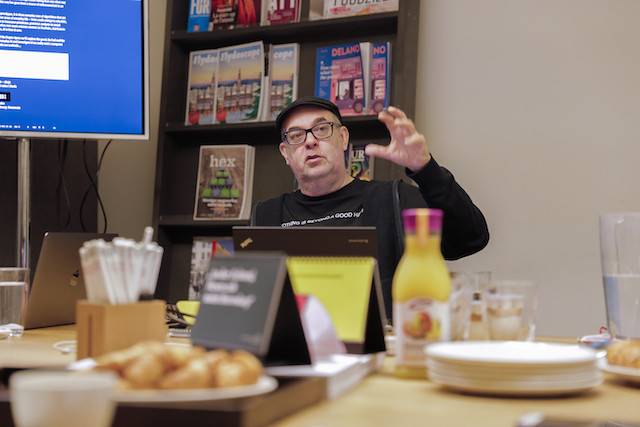Dating & data
The number of couples meeting online has exploded. Today one in five couples meet through dating apps. If you have ever used a dating app, did you think what might happen to your personal information?
“When people come to me and ask why should I protect my data, I show them this site,” Pinchen says, bringing up the “Dating Brokers” investigation by not-for-profit Tactical Tech site. In 2017, two experts purchased 1 million dating profiles for $136 from a US company trading dating profiles from all over the world. The batch included 5 million photos, usernames, email addresses, nationalities, gender, sexual preferences and other detailed personal information from people who had created profiles on dating websites. The purchase exposed a network of companies monetising this information without the conscious consent of users.
What’s the worst that can happen?
“Any technology can and will be used for bad purposes,” Pinchen says, and facial recognition is ripe for this. The worrying trend here, he says is deep fakes, which put photos of a person through an algorithm and project their likeness onto the face of another person to create a fake video. “Deep fakes were developed for porn, practically everything was developed for porn,” he explains. “You take a porn movie and a photo of Emma Watson, for example, and place her face on that of a pornstar and then you’ve an Emma Watson porn movie.”
The market has now evolved and this tool is increasingly being used in revenge porn situations, where disgruntled partners put their ex’s face in a porn film. Technology is so powerful today, that these kinds of fake videos are being made through 3D graphics, making it harder to spot. Pinchen adds it’s also possible to generate people’s voices.
The site that made Pinchen want to quit
Pinchen said he’s confronted with a lot of unpleasant uses of new technology and data in his research as an online privacy expert. Last year, he said he nearly quit, when he encountered the AI is for porn search engine. This site enables people to take a photograph, either found online or simply a photo taken of a stranger in the street, and scan the internet for their likeness. The site will return pornographic content of people who resemble the person pictured. “When you find the face you want, you hit the fap button, it takes you to the actual porn itself,” Pinchen explained. “I thought of all the great things you can do with technology, all the amazing things, and this is what you’re doing!”

Paperjam and Delano journalists listen to Chris Pinchen talk at Maison Moderne (the company that publishes both titles) on 9 January 2019. Photo: Romain Gamba/Maison Moderne
Spam in Luxembourgish works
Luxembourgers shouldn’t be fooled into thinking that just because their language isn’t widely spoken, doesn’t mean it cannot be used against them. According to Pinchen, “spam in Luxembourgish, is fantastic”. “Everyone says ‘this has to be real, no-one is going to send spam in Luxembourgish’”.
It fools people because as a written language Luxembourgish is relatively young and so people may be less likely to suspect an email filled with orthographic errors to be a phishing attempt, for example.
Parents need to educate themselves
“The most important thing for kids on the internet is trust, if you destroy trust by spying on them, then you will never be able to have a conversation,” Pinchen says. This is something he repeats over and over at parents’ evenings when confronted with adults wanting to install spyware on their children’s phones or tablets. But parental spying or imposing strict controls does not make young people safer, he says. If anything, it makes matters worse because young people are less likely to report bad things that happen online to parents or their school, “because they do not believe adults are capable of understanding what’s happening to them, they don’t believe that adults possess skills and knowledge to be able to help them in that situation.”
For Pinchen, the key is to have a dialogue on internet safety. “You have to discuss with kids and this means you have to educate yourself,” he says.
